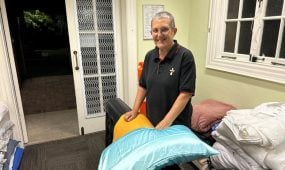Anglicare Southern Queensland launches home share project
Justice & Advocacy
Find out how Anglicare Southern Queensland is exploring house sharing opportunities in SEQ towards developing a model for future piloting

You might have noticed a new concept in housing being covered in the news over the past couple of years.
“Home-sharing” or “co-housing” projects around the world are seeking to address the housing crisis by matching homeowners with spare rooms — particularly older people wanting to remain in their homes — with people who need somewhere to live.
Sunshine Coast resident Sally said her experience of home-sharing was overwhelmingly positive.
“I had a TAFE student one time, lived in during the week and then went home at weekends,” Sally said.
“He was only a young chap, and his mum came in and introduced him.
“He was just focused on learning, and getting things done.
“So, yes, I had a very good relationship with him and never had a problem.”
Sally owns one of the 13 million spare rooms estimated in homes across Australia.
With a housing crisis that includes 122,000 Australians experiencing homelessness and countless spare rooms, it seems bringing the two together could be a perfect match.
University of the Sunshine Coast researcher, Dr Anna McKinlay, said that house sharing works best when the matching is done well.
“There are lots of great stories about intergenerational house sharing like Sally’s,” Dr McKinlay said.
“We can certainly learn from those individual stories, but to repeat that kind of success, we need to understand both what works, and the challenges, in more detail.”
Anglicare has been working with Dr McKinlay and her colleague Dr Trudi Flynn to discuss these issues with diverse groups across the community, with a view to developing an Anglicare home share model and pilot.
Advertisement
“We’ve spoken to older people, uni students, care-leavers, and even Anglicare staff who can find it difficult to find somewhere to live, particularly in regional areas,” Dr McKinlay said.
There are some common themes emerging from the conversations.
“Many people think that home sharing is a great idea, and they can see the benefits such as companionship, and having someone to help out with household tasks and bills,” she said.
“But they also have questions about issues such as privacy, safety, finances and how to negotiate potential conflict.”
Anglicare’s Group Manager for Home and Community (Aged and Community Services), Sue Montgomery, said that understanding these concerns is critical to ensuring a home sharing pilot is successful.
“We particularly need to hear from homeowners with a room or two to spare,” Ms Montgomery said.
“What would encourage them to offer a room to someone looking for a home?
“What could Anglicare offer in the way of help to make that process easier, or to smooth possible bumps in the relationship?
Advertisement
“With the housing crisis as bad as it is, this is one way people might be able to find not just a roof over their heads, but also the human connection that helps make that space feel like a home.”
If you’re a homeowner, either owning outright or with a mortgage, we’d love to hear your thoughts on home-sharing in the anonymous survey.
Editor’s note: For more information or questions, please contact Dr Anna McKinlay at amckinl1@usc.edu.au or visit the Anglicare Southern Queensland website.
We’ll be sharing the results in anglican focus and on the Anglicare Southern Queensland website, so stay tuned for more.






